Charles Bukowski's work has influenced popular culture many times over in many forms, and his work has been referenced in film, television, music and theater.
Charles Bukowski's work has influenced popular culture many times over in many forms, and his work has been referenced in film, television, music and theater.
The 1980 film Cannibal Apocalypse features a character called Charlie Bukowski.
Several films have been made about Bukowski’s life, most involving Bukowski’s literary alter ego, Henry Chinaski. Barfly, which is probably the best known Bukowski autobiographic film, starring Mickey Rourke as Chinaski, centered on Bukowski’s time in Los Angeles while drinking and writing. [1] While early on in the filming, Bukowski (who also wrote the screenplay) spoke approvingly of Rourke's portrayal; [2] he would later go on to say that he felt the actor overplayed the character. [3]
Bukowski's film incarnations have stretched to even foreign lands outside of the United States. In 1981, Italian director Marco Ferrari created Tales of Ordinary Madness , which was based on several of Bukowski's short stories collected in The Most Beautiful Woman in Town . [4] In 1987, a small Belgian film named Crazy Love was released. Directed by Dominique Deruddere, the script was co-written by Charles Bukowski and is now considered one of the best films in world cinema dating back to the 1980s. [5]
In 1995 actor Sean Penn (a good friend of Bukowski's) directed his second feature film, an independent piece named The Crossing Guard starring Jack Nicholson, Robin Wright, and David Morse. The closing credits of the film contain a dedication to Charles Bukowski. [6]
In 2005, a cinematic adaption of his novel Factotum, directed by Bent Hamer and starring Matt Dillon as Henry Chinaski, was released [7] to largely favorable reviews, scoring a 75% "Fresh Rating" on the film review site Rotten Tomatoes. [8]
The 2009 French film Cartagena (French : L'homme de chevet) features Sophie Marceau as a quadriplegic woman named Muriel who loves the writings of Bukowski. She has her caregiver, an alcoholic and former boxer named Léo (played by Christopher Lambert), read passages of Bukowski to her, and she often compares Léo's mannerisms and personality to the poet, implying that their similarities are why she hired him in the first place. [9]
In the 2018 film Beautiful Boy , Nic Sheff recites part of the Bukowski poem, "Let it Enfold You" to his class at Hampshire College. The poem, in its entirety, is recited in the end credits of the film.
Charles Bukowski has left an impression on many musicians throughout the years through his work. Bono, lead singer of the commercially and critically acclaimed Irish rock band U2, credits Bukowski with a part in his love for American literature, saying "Here was a guy who was like 'Look, I have no time for metaphors. Can we just get straight down to the bone... the marrow of the bone' ". [10] U2 would later pay tribute to Bukowski in "Dirty Day", the ninth track off their widely successful album Zooropa (1993). [11]
American singer-songwriter Tom Waits considers Charles Bukowski a huge influence as well. He cites Bukowski's work as "very musical" in nature and calls Bukowski "one of the most colourful and important writers of modern fiction, poetry, prose, in contemporary literature...". He also cites a Bukowski poem as the inspiration for the song "Frank's Wild Years" off his 1983 album Swordfishtrombones . [12] Even their subject matter is similar in structure and content as both Waits and Bukowski write about dark places, sadness, drifters and loneliness. [13] The opening line of Waits's Rock and Roll Hall of Fame biography also puts the two on similar platforms, reading "Tom Waits is a gruff-voiced, big-hearted singer/pianist who is to songwriting what Charles Bukowski is to poetry". [14]
A number of bands have name-dropped Charles Bukowski and his work over the years. American indie rock band Modest Mouse has made two songs that references the writer: one plainly titled "Bukowski" and another off their album The Lonesome Crowded West , titled "Long Distance Drunk". The Good Life have a track called "Album of the Year", from their album also titled Album of the Year, which mentions Charles Bukowski. The Red Hot Chili Peppers mention Bukowski in their song "Mellowship Slinky in B Major" off their 1991 album Blood Sugar Sex Magik . English alternative rock band The Boo Radleys have a song called "Charles Bukowski is Dead" from their 1995 album Wake Up! . The Dogs D'Amour, a rock band from London, England, reference Charles Bukowski and his misadventures in a track called "Bullet Proof Poet" off their third studio album A Graveyard Full of Empty Bottles . Dave Alvin has a song named "Burning in Water Drowning in Flame" off his 1993 album Museum of the Heart that also references the writer. The Florida band Hot Water Music takes their name from a Bukowski short story collection of the same name. The British pop-punk group Moose Blood references Bukowski on the track entitled "Bukowski" on their album I'll Keep You in Mind, From Time to Time . The 2017 English band Kasabian mention "reciting Charles Bukowski" in their song "You're in love with a Psycho". The Arctic Monkeys reference Bukowski in their song "She Looks Like Fun" on the 2018 album Tranquility Base Hotel & Casino.
Charles Bukowski has been depicted on television as well, namely on the Showtime comedy-drama series Californication. The show's main character Hank Moody, played by actor David Duchovny, is an author based in Los Angeles who subscribes to the same kind of lifestyle that Bukowski became known for. The show depicts profuse indulgence of alcoholism, sex and narcotics, which many critics have described as a television adaption of Bukowski's third novel Women. [15] In the ninth episode of the first season, Moody's girlfriend can be seen reading Sifting Through the Madness For The World, The Line, The Way: New Poems, [16] a collection of Bukowski's posthumously-published work.
Charles Bukowski's work and life has also translated into a few plays and theatre pieces as well. Barflies was created by Scottish-specific theatre group Grid Iron and it centers on Bukowski's literary alter ego and main protagonist, Henry Chinaski. It is said to be based on three short stories, two poems and about a dozen other extracts from Bukowski's work and explores the alcoholism and women in Bukowski's life. [17] Paul Peditto created a play entitled Buk: The Life and Times of Charles Bukowski. The play involves the life and times of a younger and older version of Bukowski's alter ego, Chinanski, sometimes finding the two interacting with each other. During the writing of the play Peditto wrote many letters to Bukowski, and both the playwright and author continued their exchange until Bukowski's death. For the Live Bait Theater-Prop Theatre co-production of the play, the letters where hung in the lobby outside the theater for the audience to read before and after the show. [18] B.S.: Bukowski.Sondheim, an ongoing production created by Joanne Gordon, the artistic director of the California Repertory Company, was released November 2 through December 8, 2012, at the Queen Mary's theatre in Long Beach, California. The work fuses together the poetry of Bukowski and the music and lyrics of American composer Stephen Sondheim. Both Sondheim and the Bukowski estate have provided their consent for the making of this production and the use of their respective works. [19]

Thomas Alan Waits is an American musician, composer, songwriter, and actor. His lyrics often focus on the underbelly of society and are delivered in his trademark deep, gravelly voice. He began in the folk scene during the 1970s, but his music since the 1980s has reflected influence from such diverse genres as rock, country, Delta blues, opera, vaudeville, cabaret, funk, hip hop and experimental techniques verging on industrial music. Per The Wall Street Journal, Waits “has composed a body of work that’s at least comparable to any songwriter’s in pop today. A keen, sensitive and sympathetic chronicler of the adrift and downtroddern, Mr. Waits creates three-dimensional characters who, even in their confusion and despair, are capable of insight and startling points of view. Their stories are accompanied by music that’s unlike any other in pop history.”
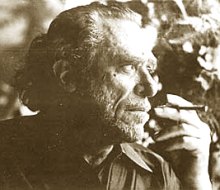
Henry Charles Bukowski was an American poet, novelist, and short story writer. His writing was influenced by the social, cultural, and economic ambience of his adopted home city of Los Angeles. Bukowski's work addresses the ordinary lives of poor Americans, the act of writing, alcohol, relationships with women, and the drudgery of work. The FBI kept a file on him as a result of his column Notes of a Dirty Old Man in the LA underground newspaper Open City.

Les Fleurs du mal is a volume of French poetry by Charles Baudelaire.

Delmore Schwartz was an American poet and short story writer.

Blue Valentine is the sixth studio album by singer and songwriter Tom Waits, released on September 5, 1978 on Asylum Records. It was recorded over the course of six sessions from July to August 1978 with producer Bones Howe. Rickie Lee Jones is pictured with Waits on the back cover.
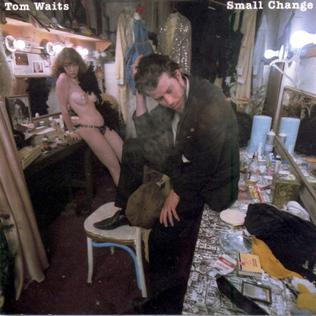
Small Change is the fourth studio album by singer and songwriter Tom Waits, released on September 21, 1976 on Asylum Records. It was recorded in July at Wally Heider's Studio 3 in Hollywood. It was successful commercially and outsold his previous albums. This resulted in Waits putting together a touring band - The Nocturnal Emissions, which consisted of Frank Vicari on tenor saxophone, FitzGerald Jenkins on bass guitar and Chip White on drums and vibraphone. The Nocturnal Emissions toured Europe and the United States extensively from October 1976 till May 1977.

Henry Gibson was an American actor, comedian and poet. He played roles in the TV sketch-comedy series Rowan & Martin's Laugh-In from 1968 to 1971, was the voice of the protagonist Wilbur in the animated feature Charlotte's Web (1973), portrayed country star Haven Hamilton in Robert Altman's film Nashville (1975) and the Illinois Nazi leader in The Blues Brothers (1980), and appeared in The 'Burbs (1989).
Henry Charles "Hank" Chinaski is the literary alter ego of the American writer Charles Bukowski, appearing in five of Bukowski's novels, a number of his short stories and poems, and the films Barfly and Factotum. Although much of Chinaski's biography is based on Bukowski's own life story, the Chinaski character is still a literary creation that is constructed with the veneer of what the writer Adam Kirsch calls "a pulp fiction hero." Works of fiction that feature the character include Confessions of a Man Insane Enough to Live With the Beasts (1965), Post Office (1971), South of No North (1973), Factotum (1975), Women (1978), Ham on Rye (1982), Hot Water Music (1983), Hollywood (1989), and Septuagenarian Stew (1990). He is also mentioned briefly in the beginning of Bukowski's last novel, Pulp (1994).
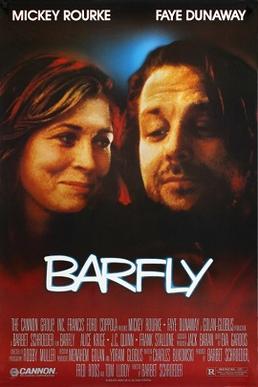
Barfly is a 1987 American black comedy film directed by Barbet Schroeder and starring Mickey Rourke and Faye Dunaway. The film is a semi-autobiography of poet/author Charles Bukowski during the time he spent drinking heavily in Los Angeles, and it presents Bukowski's alter ego Henry Chinaski. The screenplay, written by Bukowski, was commissioned by the Iranian-born Swiss film director Barbet Schroeder, and it was published in 1984, when film production was still pending.

Post Office is the first novel written by American writer Charles Bukowski, published in 1971. The book is an autobiographical memoir of Bukowski's years working at the United States Postal Service. The film rights to the novel were sold in the early 1970s, but a film has not been made thus far.
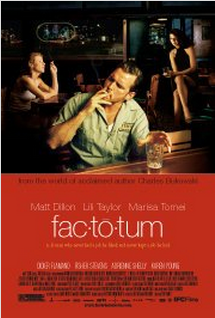
Factotum is a 2005 French-Norwegian dark comedy-drama film co-written and directed by Bent Hamer, adapted from the 1975 novel of the same name by Charles Bukowski. It stars Matt Dillon as Bukowski's alter ego, Henry Chinaski. Although events in the book take place in Los Angeles in the 1940s, the film has a contemporary setting.

Women is a 1978 novel written by Charles Bukowski, starring his semi-autobiographical character Henry Chinaski. In contrast to Factotum, Post Office and Ham on Rye, Women is centered on Chinaski's later life, as a celebrated poet and writer, not as a dead-end lowlife. It does, however, feature the same constant carousel of women with whom Chinaski only finds temporary fulfillment.
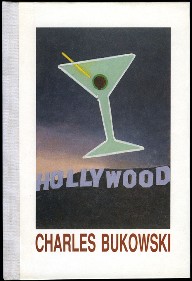
Hollywood is a 1989 novel by Charles Bukowski which fictionalizes his experiences writing the screenplay for the film Barfly and taking part in its tumultuous journey to the silver screen. It is narrated in the first person.
Dirty realism is a term coined by Bill Buford of Granta magazine to define a North American literary movement. Writers in this sub-category of realism are said to depict the seamier or more mundane aspects of ordinary life in spare, unadorned language.

Tales of Ordinary Madness is a 1981 film by Italian director Marco Ferreri. It was shot in English in the United States, featuring Ben Gazzara and Ornella Muti in the leading roles. The film's title and subject matter are based on the works and the person of US poet Charles Bukowski, including the short story The Most Beautiful Woman in Town.
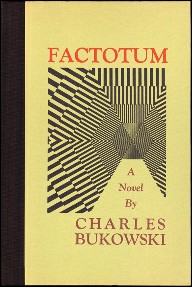
Factotum (1975) is a picaresque novel by American author Charles Bukowski. It is Bukowski’s second novel and a prequel to Post Office (1971).
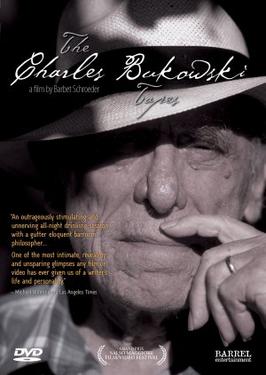
The Charles Bukowski Tapes are a collection of short interviews with the American writer/poet Charles Bukowski, filmed and assembled by Barbet Schroeder and first published in 1985. Today, the video documentary is considered a cult classic.
Dylan Marlais Thomas (1914–1953) was a Welsh poet and writer who — along with his work — has been remembered and referred to by a number of artists in various media.

Pulp is the last completed novel by Los Angeles poet and writer Charles Bukowski. It was published in 1994, shortly before Bukowski's death. He began writing it in 1991 and encountered several problems during its creation. He fell ill during the spring of 1993, only three-quarters of the way through Pulp.

Chinaski is a Czech pop rock group. In 2005, they won an Anděl Award, granted by the Czech Academy of Popular Music, and repeated this success in 2007. They have also repeatedly placed in the top ranks of the Český slavík awards.